

Two Colossal Plastic Garbage Patches Discovered In Arctic Ocean. We’ve long known that our plastic tends to end up in the ocean.
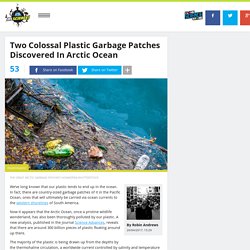
In fact, there are country-sized garbage patches of it in the Pacific Ocean, ones that will ultimately be carried via ocean currents to the western shorelines of South America. Now it appears that the Arctic Ocean, once a pristine wildlife wonderland, has also been thoroughly polluted by our plastic. A new analysis, published in the journal Science Advances, reveals that there are around 300 billion pieces of plastic floating around up there. The majority of the plastic is being drawn up from the depths by the thermohaline circulation, a worldwide current controlled by salinity and temperature differentials. It normally delivers warm water to the Arctic, but it appears plastic from the North Atlantic shorelines is also piggybacking along for the ride. Man-made climate change is chipping at the sea ice cover there too, which means there are less physical barriers to the inward flow of rubbish these days.
There You Go! Corking climate change: sustainable practices bear fruit in champagne production. As revelers around the world ring in the new year with glasses of champagne tonight, they’re probably not toasting to the sustainable agricultural methods that went into some of the bottles.
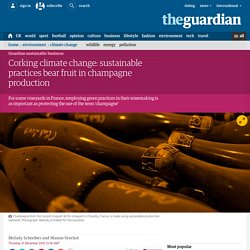
But for some vineyards in France – where earlier this month nearly 200 nations signed a landmark deal to limit climate change – employing green practices in their winemaking is as important as protecting the use of the term “champagne”, which applies only to the bubbly produced in a region of France that bears the same name. Climate change is prompting some farmers in this celebrated region to switch to more eco-friendly techniques which, they hope, will also enable their champagne to command higher prices from consumers who care about whether what they are drinking is sustainably produced. In 2014, champagne production was valued at €4.5bn ($4.8bn) per year. Nearly 16,000 winegrowers produced grapes for 300 champagne houses, which sold 307m bottles that year.
What is fracking and why is it controversial? Drilling companies suggest trillions of cubic feet of shale gas may be recoverable from underneath parts of the UK through a process known as "fracking".
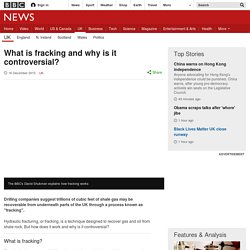
Hydraulic fracturing, or fracking, is a technique designed to recover gas and oil from shale rock. Uncil blocks Little Plumpton fracking application - BBC News. An application to start fracking at a site on the Fylde coast in Lancashire has been rejected by councillors.
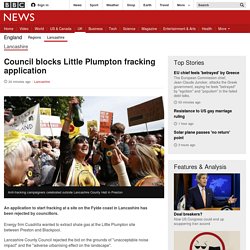
Energy firm Cuadrilla wanted to extract shale gas at the Little Plumpton site between Preston and Blackpool. Lancashire County Council rejected the bid on the grounds of "unacceptable noise impact" and the "adverse urbanising effect on the landscape". Cuadrilla said it was "surprised and disappointed" and would consider its "options" regarding an appeal. A spokesman added: "We remain committed to the responsible exploration of the huge quantity of natural gas locked up in the shale rock deep underneath Lancashire.
" Plastic Bags Are Hurting More Than The Environment. Like ATTN: on facebook for more content like this.
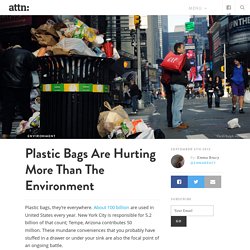
Plastic bags, they’re everywhere. About 100 billion are used in United States every year. New York City is responsible for 5.2 billion of that count; Tempe, Arizona contributes 50 million. These mundane conveniences that you probably have stuffed in a drawer or under your sink are also the focal point of an ongoing battle. Takepart. Newspapers, cans, bottles, batteries, and your old clothing—those are just some of the items that recycling helps keep out of the world’s landfills.
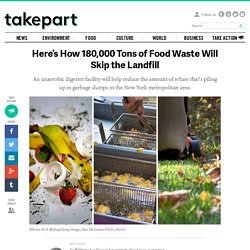
Now, thanks to a gigantic anaerobic digester plant that’s set to be constructed on Long Island, New York, enormous amounts of food waste will be recycled, reducing greenhouse gas emissions and generating energy. On Tuesday, New York Gov. Andrew Cuomo announced that a 62-acre plant will be built in Yaphank, about 60 miles east of New York City. The facility will be able to keep 180,000 tons of waste out of area landfills, including 120,000 tons of food trash—discarded banana peels, eggshells, even a can of half-eaten tuna—as well as 30,000 tons of fat, oil, and grease from area restaurants. That dwarfs the 500 tons of waste that a small anaerobic digester plant in Brooklyn processes per year, according to Capital New York.
RELATED: Throwing $165 Billion in the Trash—John Oliver Puts Food Waste on Blast. Fracking bids to be fast-tracked - BBC News. Shale gas planning applications are to be fast-tracked under new government measures to crack down on councils that delay on making a decision.
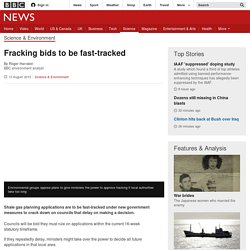
Councils will be told they must rule on applications within the current 16-week statutory timeframe. If they repeatedly delay, ministers might take over the power to decide all future applications in that local area. Environmentalists say it makes a mockery of the government's promise to give power to local people. The government says it will take local views into account, but that developing shale gas is a national priority that must not be held up.
Lebanon rubbish crisis: Thousands attend anti-government rally - BBC News. Thousands of people have taken part in a rally in the Lebanese capital Beirut in protest at a government they say is corrupt and ineffective.

Security was high amid fears the demonstrations could turn violent, as similar protests did last weekend. Organisers of Saturday's mostly peaceful rally demanded the environment minister resign within 72 hours. The government's failure to solve the crisis over the disposal of rubbish led to the 'You Stink' campaign. They have been calling on the government to hold snap parliamentary elections, and also want the interior minister held to account for excessive force by police at least week's protests. Lebanon wracked by dysfunction Lebanon cartoons vent anger at rubbish crisis The protesters poured into a major square in central Beirut, waving Lebanese flags and shouting anti-government slogans.